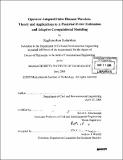| dc.contributor.advisor | Kevin S Amaratunga. | en_US |
| dc.contributor.author | Sudarshan, Raghunathan, 1978- | en_US |
| dc.contributor.other | Massachusetts Institute of Technology. Dept. of Civil and Environmental Engineering. | en_US |
| dc.date.accessioned | 2006-02-02T18:51:19Z | |
| dc.date.available | 2006-02-02T18:51:19Z | |
| dc.date.copyright | 2005 | en_US |
| dc.date.issued | 2005 | en_US |
| dc.identifier.uri | http://hdl.handle.net/1721.1/31132 | |
| dc.description | Thesis (Ph. D.)--Massachusetts Institute of Technology, Dept. of Civil and Environmental Engineering, 2005. | en_US |
| dc.description | Includes bibliographical references (leaves 166-171). | en_US |
| dc.description.abstract | We propose a simple and unified approach for a posteriori error estimation and adaptive mesh refinement in finite element analysis using multiresolution signal processing principles. Given a sequence of nested discretizations of a domain we begin by constructing approximation spaces at each level of discretization spanned by conforming finite element interpolation functions. The solution to the virtual work equation can then be expressed as a telescopic sum consisting of the solution on the coarsest mesh along with a sequence of error terms denoted as two-level errors. These error terms are the projections of the solution onto complementary spaces that are scale-orthogonal with respect to the inner product induced by the weak-form of the governing differential operator. The problem of generating a compact, yet accurate representation of the solution then reduces to that of generating a compact, yet accurate representation of each of these error components. This problem is solved in three steps: (a) we first efficiently construct a set of scale-orthogonal wavelets that form a Riesz stable basis (in the energy-norm) for the complementary spaces; (b) we then efficiently estimate the contribution of each wavelet to the two-level error and finally (c) we select a subset of the wavelets at each level to preserve and solve exactly for the corresponding coefficients. Our approach has several advantages over a posteriori error estimation and adaptive refinement techniques in vogue in finite element analysis. First, in contrast to the true error, the two-level errors can be estimated very accurately even on coarse meshes. Second, mesh refinement is carried out by the addition of wavelets rather than element subdivision. | en_US |
| dc.description.abstract | (cont.) This implies that the technique does not have to directly deal with the handling of irregular vertices. Third, the error estimation and adaptive refinement steps use the same basis. Therefore, the estimates accurately predict how much the error will reduce upon mesh refinement. Finally, the proposed approach naturally and easily accommodates error estimation and adaptive refinement based on both the energy norm as well any bounded linear functional of interest (i.e., goal-oriented error estimation and adaptivity). We demonstrate the application of our approach to the adaptive solution of second and fourth- order problems such as heat transfer, linear elasticity and deformation of thin plates. | en_US |
| dc.description.statementofresponsibility | by Raghunathan Sudarshan. | en_US |
| dc.format.extent | 171 leaves | en_US |
| dc.format.extent | 7377914 bytes | |
| dc.format.extent | 7399145 bytes | |
| dc.format.mimetype | application/pdf | |
| dc.format.mimetype | application/pdf | |
| dc.language.iso | eng | en_US |
| dc.publisher | Massachusetts Institute of Technology | en_US |
| dc.rights | M.I.T. theses are protected by copyright. They may be viewed from this source for any purpose, but reproduction or distribution in any format is prohibited without written permission. See provided URL for inquiries about permission. | en_US |
| dc.rights.uri | http://dspace.mit.edu/handle/1721.1/7582 | |
| dc.subject | Civil and Environmental Engineering. | en_US |
| dc.title | Operator-adapted finite element wavelets : theory and applications to a posteriori error estimation and adaptive computational modeling | en_US |
| dc.type | Thesis | en_US |
| dc.description.degree | Ph.D. | en_US |
| dc.contributor.department | Massachusetts Institute of Technology. Department of Civil and Environmental Engineering | |
| dc.identifier.oclc | 61171484 | en_US |
